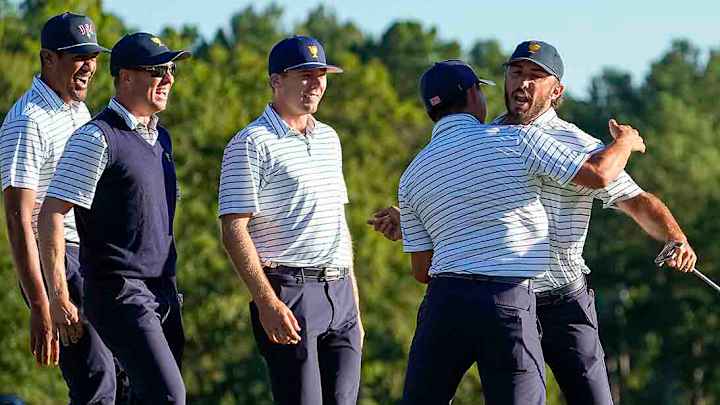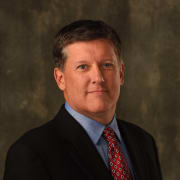Dominant on Paper and Now Showing It, the U.S. Is Turning the Presidents Cup Into a Rout

CHARLOTTE, N.C. — This seemed inevitable, and yet hardly probable. Golf is funny that way. Match play strips away some advantages. And the line between a top-10 player in the world and who is teetering around 100th can be quite fine.
All of the players at the Presidents Cup have their names on their golf bags, which suggests it took a high level of proficiency to get here.
And yet: U.S. 8, Internationals 2.
It’s gone about as poorly as was feared for the players from outside of the United States, even though the game rarely goes according to form.
All of which makes this somewhat surprising. Or does it?
“Not when you look in the team room at the players, what we’re capable of doing as a team,’’ said Jordan Spieth, who again teamed with Justin Thomas for a victory, never trailing in their match with Adam Scott and Cam Davis and winning 2 and 1. “But you can’t control what they’re going to do, right?’’
They—the International team players—just didn’t do enough. And when they did, there was someone there to knock them back to earth.
There was Canada’s Taylor Pendrith on the 18th green, for example, rolling in a lengthy birdie putt late Friday afternoon, seemingly putting his team in position for a much-needed tie.
And there was American Max Homa to roll in an 11-footer on top of him, a nice moment for the first-time U.S. Cup team player whose final act gave the U.S. that six-point advantage heading into Saturday’s double session.
MAX HOMA FOR THE WIN!
— PGA TOUR (@PGATOUR) September 23, 2022
What a moment from @MaxHoma23 to secure the final match of the day @PresidentsCup. pic.twitter.com/bihHgY2M2P
“I was nervous as could be over that putt, but it was fun,’’ Homa said. “I was telling my wife, when we talk about things money can’t buy, money cannot buy that feeling. And that was something that I will remember forever, and I will tell anybody who ever wants to hear about it how that felt.’’
It’s too bad that type of moment didn’t occur in an overall match that is more competitive.
Trevor Immelman, who held off Tiger Woods to win the 2008 Masters, knows that anything is possible in golf. Davis Love III, who to this day can’t believe his 2012 U.S. Ryder Cup team blew a final-day lead at Medinah, is just as knowledgeable on that subject.
And yet, here we are halfway through the Presidents Cup, and it’s all but over. Sure, there’s a chance for the International team to make a heroic comeback. But that’s what we were saying prior to the competition beginning, too.
Now, 10 points into the Presidents Cup that pits an American team against international players from outside of Europe, the expected rout is occurring. After falling behind 4-1 in Thursday’s foursomes session, the International team hoped to cut into the advantage in the four-ball format in which they’ve historically held their own.
Nope.
In four of the five matches, the International team never led at any point and was probably fortunate to come out with two ties. In the first match, Scott and Davis went 3 down through eight holes and never got closer than two back.
The seemingly strong team of Hideki Matsuyama and Tom Kim didn’t make a birdie until the 7th hole—and still lost to an eagle—going 5 down to Patrick Cantlay and Xander Schauffele only eight holes into the match.
The team of Sungjae Im and Sebastian Munoz had a best-ball score of 63—and still could do no better than a tie against Scottie Scheffler and Sam Burns (they did rally from being 2 down with six to play and never led.)
Immelman was banking on 12 new players with no Presidents Cup baggage and the idea that they could play without burden. Far easier in theory than practice.
“I think it's quite clear that we're the underdogs. We generally have been in this competition over the years so it's a tag that we're used to,’’ he said earlier this week. “But the exciting part for us really is I do think that it frees us up, because we have nothing to lose. If you look at our record in this tournament and you look at our World Rankings versus their World Rankings, we have absolutely nothing to lose.
“So we can go out there and play absolutely as free as we want, free as we can, and see if we can match up with the crazy good skills the Americans have, that they show us week in and week out.’’
It was absolutely the best approach for Immelman to take. The problem is, you still need to perform. You need to beat the other guy in match play. And the International team through days has not gotten enough out of its veteran, star players. Five of the 10 matches have gotten to the 18th green and yet the Internationals have just one outright win.
Scott, who is making his 10th Presidents Cup appearance and is coming off a solid year that saw him qualify for the Tour Championship, is 0-2. Hideki Matsuyama, who is playing in his fifth Presidents Cup, is also 0-2.
Corey Conners, one of the best ballstrikers in the world and expected to help the International team in his first appearance, made just two birdies Friday but couldn’t get anything to drop late in a tense match with his partner Pendrith against Billy Horschel and Homa.
It’s easy to simply say the Americans just made more putts, but there is considerable truth in that. It’s a talking point they are familiar with at the Ryder Cup.
“We’re used to being called the favorite,’’ Love said. “Even when we lose three Ryder Cups in a row, they tell us, “Oh, but they’re the favorite.’ The other captain or the other team or you guys remind us that we’re the favorite. So we’re used to that. That’s on paper, and a lot of great coaches will tell you the game’s not played on paper.’’
Perhaps that is the prescient point, especially as it applied to the U.S. team. Love played in six Ryder Cups, losing four times, including huge defeats in 2004 and 2006. His overall record is 9-12-5. He knows a bit about being expected to win.
He captained the Ryder Cup team twice, with the shocking defeat 10 years ago one that still stings. Love said they never had a plan for a four-point lead with one day to go. For all the planning that goes into these things, it never occurred to anyone they might be on the verge of a rout—one that they still couldn’t close out.
Things have turned for the better in recent times. Since the 2014 Ryder Cup loss at Gleneagles, the U.S. has suffered just one defeat—at the 2018 Ryder Cup. It had close calls at the 2015 and 2019 Presidents Cups, but comfortable victories at the others.
Last year’s 19-9 victory at the Ryder Cup—where Love assisted Steve Stricker—was a testament to the skill and depth of the U.S. team. Without Dustin Johnson, who led the U.S. in points, and other contributors Bryson DeChambeau and Brooks Koepka due to their LIV Golf affiliations, the Americans have hardly slipped at this Presidents Cup.
The pairings of Jordan Spieth-Justin Thomas, Patrick Cantlay-Xander Schauffele and Scottie Scheffler-Sam Burns should make things pretty smooth for captain Zach Johnson next year in Rome. And to think: Tony Finau and Collin Morikawa didn’t play Friday; and Homa drained two late birdie putts to help him and Horschel win their match.
The Americans seem to have an embarrassment of riches and it will take a monumental effort from the International squad Saturday to even have a chance going into Sunday’s singles.
If the International team can somehow take six of eight points, it will still trail 10-8 going into 12 singles matches. That would still mean having to capture 7.5 out of 12 points on Sunday in order to win. Anything less than six points Saturday makes the task all the more difficult.
“We’ve just got to hope the guys perform better when they get to the greens,’’ Immelman said. “That’s where it’s been separated now.’’
Strange things happen in golf, which both Immelman and Love know all too well. Perhaps that’s why they both talk like it’s not over, even if it appears to be so.
“We’ve seen a lot of big leads lost,’’ Love said.
“There’s two days left and we’ll be playing as hard as we can play,’’ Immelman said. “Promise.’’
